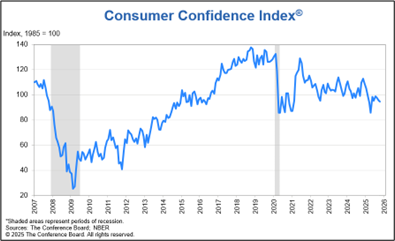Consumer Confidence Edges Lower as Consumers Stay Guarded Heading into Winter
U.S. consumer confidence eased slightly in October, slipping to 94.6 from a revised 95.6 in September, according to the latest report from The Conference Board released yesterday. While the headline number remains relatively stable, economists note optimism about future conditions continues to lag, signaling persistent caution among households.
Similar to the Conference Board report, the University of Michigan Consumer Sentiment report also found little change to the month-over-month index, with modest increases to the current personal financial situation index and a decrease in personal financial expectations for the future. In this report, there was also little evidence the current shutdown of the federal government was top of mind for consumers, as only 2% of respondents spontaneously referenced the situation.
Notably, confidence improved among households earning $75,000 or more, indicating higher-income consumers remain relatively resilient. For industries tied to discretionary spending, like recreational boating, this segment often drives early signals of recovery in big-ticket purchases and leisure spending.
The Present Situation Index improved modestly, suggesting Americans still feel reasonably secure about jobs and current business conditions. Yet the Expectations Index fell again—to 71.5, well below the 80-point line historically associated with recession risk. For the recreational boating industry, the data points to a steady yet restrained consumer environment. High financing costs and lingering inflation, which expectations edged up to 5.9%, continue to shape spending priorities, prompting buyers to weigh discretionary purchases more carefully.
Confidence directly influences big-ticket spending, and when consumers feel uncertain about income or employment, they often delay larger purchases. Still, stable readings in the Present Situation Index suggest that experiential and service-based segments, like rentals, storage, and maintenance, may hold firm as consumers prioritize accessible, close-to-home leisure over major upgrades.
Adding to the backdrop: The Federal Reserve is widely expected to announce a 25-basis-point interest-rate cut this week, with markets also pricing in a likely follow-up cut in December. This shift toward easier monetary policy may lower borrowing costs across consumer credit and leisure spending.
NMMA continues to monitor consumer sentiment and its implications for marine businesses. Members are encouraged to utilize resources such as the Monthly Industry Data Summary and quarterly Marine Leadership Barometer to guide decision-making and navigate evolving market dynamics.
For more economic updates and data-driven insights, visit nmma.org/statistics or contact the NMMA Business Intelligence team at [email protected].





